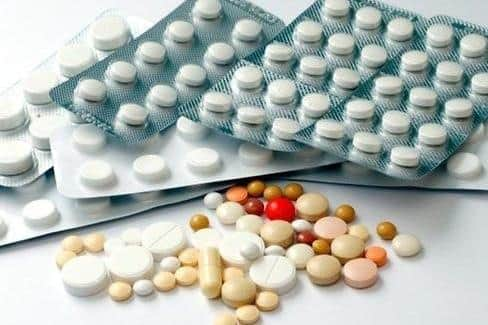Medicines ‘cliff-edge’ looming due to Protocol warns Lord Dodds after House of Lords meeting
and live on Freeview channel 276
The DUP peer was speaking after representatives of the BMA, NHS Confederation and Nuffield Trust gave evidence to the House of Lords sub-committee on the NI Protocol.
He said: “The impact of the Protocol on medicines was made clear today.
Advertisement
Hide AdAdvertisement
Hide Ad"The vast majority of our medicines are supplied through Great Britain and we were told ‘the biggest single factor causing the difficulties’ was the need for Northern Ireland to follow the Falsified Medicines Directive. It is only due to the Protocol that Northern Ireland is bound by this [EU] directive despite it only being necessary for a very tiny proportion of medicines.


“Despite the often-repeated claim that the medicines issue was resolved back in 2021, we face a cliff-edge in December [when the grace period is due to end].
“Unless there is a resolution by then, it poses a credible threat that many hundreds of medicines would be discontinued in Northern Ireland.”
Giving evidence to the committee this afternoon was Kate Ling, senior policy manager of the NHS Confederation – the umbrella organisation representing the health service in Northern Ireland.
Advertisement
Hide AdAdvertisement
Hide AdShe said: "As far as the impact is concerned at the moment we are reassured because the evidence we've had, all the feedback we've had from our members in Northern Ireland has been positive in that patients are continuing to receive the medicines that they need, which is obviously the bottom line.
"However I think this is because of the easements that have been put in place by both the EU and the UK and we're very grateful for those because it's enabled supply to continue so that there hasn't been that impact on the ground we all feared.
"But it's only working because of a huge amount of effort that's being put in at a higher level to put these easements in place, a lot of work that's being done behind the scenes to ensure that on the front line patients and providers aren't seeing too much difference.“I think a lot of the pain has been absorbed by the suppliers and the distributers, who are describing the extra hurdles, bureaucracy and the difficulties that they're facing. But the important thing is the medicines are getting through.
"From the point of view of the future our biggest worry, apart from no agreement being reached at all with regards the impasse over the protocol, we're really worried that in the rush to get a deal done and to get something over the line that the issues about supply of medicine will be perhaps forgotten about, sidelined, or not dealt with properly.“We really want to see a long lasting stable solution to this.”
Advertisement
Hide AdAdvertisement
Hide AdShe said the outstanding issues werecomplying with those requirements of the falsified medicines directive, and the centrally authorised procedure where medicines that are authorised in the EU may not be available in Northern Ireland except by going through the NIMAR procedure.
NI GP Dr Alan Stout, who holds a number of key position on the British Medical Association, also gave evidence.
He said: "As a GP I have a clinical responsibility for absolutely everything I prescribe, but I'm only a prescriber. I put my signature on the bottom of a prescription and as if by magic the medication appears in a patient's hands.
"This is very important because as doctors, and for our patients, we have been immune and very much protected from all of the work that has been going on in the background to protect and maintain that position.
Advertisement
Hide AdAdvertisement
Hide Ad"The mitigations, the derogations, the negotiations have clearly worked so to date we have not had any issue in terms of the supply of medication or disruption to supply chain, safety issues, mass changes, or anything along those lines, which is a huge positive."But also what they have done is prevented us from falling off this metaphorical cliff that everybody keeps referring to.
"We didn't fall off that cliff but it's led us to another cliff edge of when the current mitigations and derogations actually run out and that is what concerns us most – that we may see what we thought was an uninterrupted supply becoming an interrupted supply from that point onwards.”